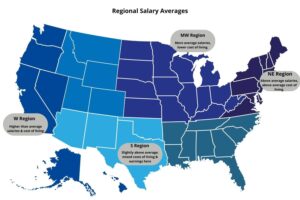Last updated on January 6th, 2025 at 12:22 am
So, you’re interested in starting a career as a home inspector, or you’re already in the field looking to benchmark your earnings. Either being the case, you’ve probably wondered what a home inspector’s salary ballparks.
Home inspectors are the unsung heroes of the real estate sector. They are the meticulous professionals who ensure properties are safe, structurally sound, and worth every penny of their asking price. This significant responsibility aligns with the potential for a rewarding financial return.
In this post, we’ll cover the average home inspector’s salary, examine the impact of location, experience, and certifications, and provide strategies to boost earnings. Buckle up and read on to discover the value of this crucial profession.
Importance of Home Inspectors
Home inspectors are like detectives in the real estate world. They play a pivotal role in property transactions, ensuring buyers, sellers, and real estate agents are well-informed about a property’s condition before any exchange of ownership.
Ensuring Property Safety
The primary responsibility of a home inspector is to ensure safety. They meticulously examine a property’s structure and systems, including electrical, plumbing, and HVAC, to identify any deficiencies that could pose a safety risk. This thorough evaluation helps potential buyers make informed decisions, preventing future surprises and potentially costly repairs.
Maintaining Property Value
Home inspectors also have a significant impact on maintaining property values. By identifying necessary repairs or upgrades, they help homeowners protect their investment and ensure the property’s condition aligns with its market value. This is particularly crucial for sellers, who can address any issues before listing their property to secure the best possible selling price.
Detailing Property Condition
Finally, home inspectors provide a detailed report on the property’s condition, outlining any potential issues or areas that require attention. This report is a valuable tool for both buyers and sellers, offering an unbiased, professional evaluation of the property’s current state. It serves as a negotiation tool and a guide for future maintenance.
In summary, a home inspector’s role is not only critical but also multifaceted. They contribute to the safety, financial stability, and peace of mind of all parties involved in a real estate transaction. This level of responsibility and impact is often reflected in the average home inspector’s salary, which we’ll explore in the next sections.
Determining Factors of a Home Inspector’s Salary
A home inspector’s salary can vary based on several factors. Understanding these can help you set realistic expectations and plan your career path strategically. Here, we’ll look at key elements that can influence a home inspector’s earnings.
Experience
Just like in any profession, experience plays a significant role in determining a home inspector’s salary. As you gain more experience in the field, you’ll likely become more efficient and effective in your inspections. This industry expertise can directly impact your earnings, as clients and real estate professionals often place a higher value on experienced inspectors who can provide thorough and accurate reports.
Location
Geographical location can also greatly influence a home inspector’s salary. Some regions have a higher demand for home inspections due to a bustling real estate market, while others might offer higher salaries to attract inspectors to areas with lower demand.
The cost of living in a particular area can also impact salaries. Remember, a high salary in an area with a high cost of living might not stretch as far as a lower salary in a more affordable area.
Certification
Certification is another crucial factor in a home inspector’s salary. Being certified by a recognized industry organization can not only increase your credibility but also potentially your earnings. It shows potential clients and employers that you’ve met a certain standard of knowledge and competence in your field. In some regions, certification is a requirement for practicing as a home inspector.
Size and Complexity of the Property
Lastly, the size and complexity of each property being inspected can impact a home inspector’s earnings. Larger or older properties often require more time and expertise to inspect, resulting in higher fees. Specialized inspections, like for commercial properties or historic homes, can also command higher prices.
While the average home inspector’s salary can give you a general idea of potential earnings, it’s important to remember that individual income can vary based on these factors.

National Overview of the Average Home Inspector Salary
As discussed above, a home inspector’s salary can fluctuate based on various factors. However, to give you a ballpark figure, let’s go over the national average salary for home inspectors in the United States.
Salary Range and Median
As of the most recent data, the median annual wage for home inspectors across the United States is approximately $60,000. The median wage represents the center of the income range, meaning that half of home inspectors earn more than this amount, while the other half earn less.
The salary range for home inspectors, however, is quite broad. On the lower end, home inspectors in the bottom 10% of earners make less than $36,000 per year. However, those in the top 10% can earn upwards of $95,000 annually. This wide range reflects the diversity in experience, location, certification, and property complexity we covered previously.
Hourly Rate
If we break it down to an hourly rate, the median wage for home inspectors is approximately $28.85 per hour. However, this can fluctuate significantly, with the lower 10% earning less than $17.30 per hour and the top 10% earning more than $45.70 per hour.
Remember that these are national averages and don’t consider regional variations. Now we can go a little deeper and dive into a breakdown by region for more localized insights.
Regional Breakdown of the Average Home Inspector Salary
To provide a more detailed perspective, let’s look at the average home inspector’s salary by region. This can help understand how salaries vary across the country and potentially influence career decisions, especially if you’re open to relocation.
Northeast Region
The Northeast region, including states like New York, Massachusetts, and Pennsylvania, typically sees higher-than-average salaries for home inspectors. This can be attributed to the area’s high cost of living and active real estate markets. The median annual wage for home inspectors in this region is approximately $65,000.
Midwest Region
In the Midwest, which consists of states such as Illinois, Michigan, and Ohio, the cost of living is generally lower. The median home inspector salary reflects this, with an average of around $55,000 per year.
South Region
The South, encompassing states from Texas to Georgia and Florida, has a wide range of salaries due to its diverse real estate markets. Urban areas with high real estate activity often offer higher wages, while rural areas might provide lower salaries. The median salary in this region sits at about $58,000.
West Region
Finally, the region including California, Washington, and Arizona is another with a high cost of living and active real estate markets. Home inspectors in this region can expect a median salary of approximately $63,000 per year.
These are median figures and actual salaries can vary significantly within each region. Factors such as metropolitan versus rural settings, the state of the housing market, and the demand for home inspections can all impact earnings.

Boosting Earnings as a Home Inspector
While we’ve discussed the average home inspector’s salary and how factors like location and experience can influence it, you might still be wondering how to increase your earnings in this profession.
Offering Additional Services
One of the most effective ways to increase your earnings is by offering additional services. These can include inspections like pest or radon inspections, energy audits, or mold detection. By expanding your services, you can provide more value to your clients and charge accordingly. Advanced, clients often appreciate the convenience of a “one-stop shop” for their inspection needs. Leveraging marketing automation tools can also help you manage these services more efficiently.
Gaining Specializations
Specializations can also significantly boost your income. For instance, becoming a certified commercial property inspector or a specialist in historic homes could allow you to charge higher fees for these specialized services. Earning these credentials typically requires additional training and certification, but further education and advanced certifications can increase your competence and credibility, leading to higher earnings.
Some home inspectors may choose to earn a degree in a related field, such as construction or engineering, to enhance their knowledge base. Others might pursue certifications in specific inspection areas, like indoor air quality or thermal imaging.
Marketing Your Services Effectively
Finally, marketing your services effectively can help you attract more clients and thereby increase your earnings. This might involve developing a professional website, leveraging social media, or investing in ad management to reach a wider audience
Your reputation is crucial in this industry, so delivering high-quality, thorough inspections and excellent customer service can also help you secure more business. By implementing these strategies, you can potentially increase your earnings beyond the average home inspector’s salary, making this career even more rewarding financially.
Never Stop Learning
Of course, it’s worth emphasizing the value of continued learning in the home inspection industry. As technologies evolve and building codes and standards change over time, staying up-to-date with the latest developments in your field is key to maintaining your expertise and providing the best possible service to your clients.
Continued education can take many forms, including formal courses, industry seminars, webinars, or even reading industry-related articles and books. Not only can this ongoing education enhance your skills and knowledge, but it can also make you more attractive to clients and potentially increase your earnings.
Final Thoughts
A career as a home inspector can be both rewarding and financially lucrative. The role you play in ensuring the safety and value of a property is invaluable, and that is often reflected in the average home inspector’s salary. While your earnings can vary based on factors such as experience, location, and the size and complexity of the properties you inspect, there are many ways to boost your income.
By offering additional services, gaining specializations, pursuing further education and certification, and marketing your services effectively, there’s always room to earn more than the average salary. Have questions, or ready to learn more about taking your business to the next level? Schedule a consultation or get a proposal from WolfPack Advising today.





